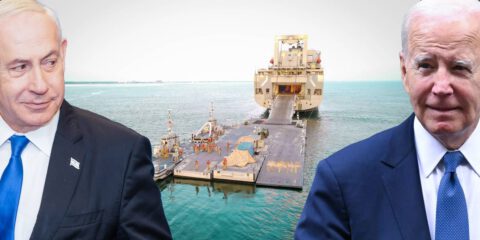The loss of Israel’s strong-state image in Ankara, together with Erdogan’s short-term need to deflect the opposition’s appropriation of the Palestinian cause have led the Turkish president to abandon his balanced realpolitik approach. For ties to return to normal, Israel will need to restore the perception of it as a strong nation and Turkey should distance itself from Hamas.
Hamas’ major terrorist attack against Israel on October 7 claimed the lives of more than 1,200 Israeli civilians, while a further 240 were abducted to Gaza. This unprecedented brutal attack constituted a breaking point not only for Israel but for the entire region. The violation of Israel’s internationally recognized borders and the atrocities committed by this ISIS-like organized terrorist army gave Jerusalem no choice but to wage a full-scale war against Hamas, an Iranian-sponsored barbaric entity.
The impact of the war was devastating for all moderate countries in the region. Unfortunately, the Iran-led axis of evil that seeks instability and destruction for the entire Middle East, managed to put an end to the positive winds of change felt in the region. The Hamas-initiated war not only overshadowed the success of the Abraham Accords by endangering the Israeli-Saudi peace process in the making, but it also ruined the fragile Israeli-Turkish normalization process.
While not approving of the scale of the Israeli response in Gaza but acknowledging the necessity of eradicating Hamas also for their national interests, the Saudis and the rest of the Abraham Accords bloc countries expressed moderate rhetoric vis-à-vis Israel. In the first two weeks of the war, Ankara also initially adopted the same approach. However, later, on October 25 Ankara formally abandoned this balanced approach when the Turkish President, Recep Tayyip Erdoğan, speaking before the Turkish parliament, openly described Hamas as “a freedom fighter organization.”
Erdoğan then went beyond this statement. On October 28, he organized a mass rally in Istanbul of hundreds of thousands and declared his intention to launch a legal campaign against the Israeli government, accusing Jerusalem of committing crimes against humanity in Gaza. He further deteriorated the relations intentionally when he openly and falsely accused Israel of sponsoring the PKK and other terror organizations acting against Turkey. But Israel sees the PKK as a terrorist entity and refrains from supporting its acts against Turkey. Erdoğan’s misleading statement has created a diplomatic crisis between Israel and Turkey. Bearing in mind Erdoğan’s statement, many Turks will blame Israel as the “mastermind” behind all potential terror attacks.
Due to Hamas’ transition into an ISIS-like force of evil in the aftermath of October 7, Jerusalem can no longer tolerate Erdoğan’s statements. In Israeli eyes, the Turkish president’s firm support for Hamas after October 7 is considered a hostile act. Therefore, on the day of the mass rally, Israeli Foreign Minister Eli Cohen had no choice but to protest against Erdoğan by withdrawing the Israeli ambassador from Ankara for consultations. Unsurprisingly on November 4, Turkey in turn called its ambassador home. It is noteworthy that both countries have refrained from downgrading bilateral relations to the level of chargé d’affaires.
Hence, the fragile normalization between Jerusalem and Ankara –which survived tensions over the Temple Mount during the last two Ramadans, and the Israeli-limited Operation Breaking Dawn in Gaza in August 2022 – has come to an end after a year and a half.
Why did Turkey choose to put an end to normalization?
Domestic Politics
As mentioned in the first two weeks of the war, Erdoğan adopted a balanced stance and chose not to damage the fragile normalization. However, his political rivals –) which unequivocally support Hamas – the secular Republican People’s Party (CHP)[i] and the far-left Turkish Labor Party (TİP) put Erdoğan in a strange position. The existence of these unexpected pro-Hamas voices has positioned Erdoğan as “the most pro-Israel leader” on the Turkish political spectrum.
Given the approaching March 2024 municipal elections, this “balanced” image no longer serves Erdoğan’s interests. On the contrary, after two weeks of heavy fighting and the images of destruction in Gaza, it seems that Erdoğan began to see Israeli-Turkish normalization as a political burden that threatened the support of his political base.
Erdoğan needs a landslide victory in the coming March 2024 municipal elections – especially in Istanbul and Ankara to allow Erdoğan to strengthen his strong-leader image and to use the grandiose budget of these two municipalities to sponsor the activities of his party and his close affiliates.
Therefore, he adopted a very blunt pro-Hamas rhetoric and organized a mass rally for hundreds of thousands of supporters with a Turkish-Palestinian flag keffiyeh scarf. It seems that he managed to neutralize the attraction of the opposition’s pro-Palestinian sentiments. The public sees the Turkish opposition’s pro-Palestinian stance as nothing more than a poor imitation of the Turkish president.
Turkish foreign policy dimensions
Israel was regarded as one of the strongest states in the region. However, on October 7 this image faded away. The lack of intelligence and the Israeli army’s inability to cope with the Hamas attack in real-time created a radical change in the way Ankara views Israel. Indeed, Erdoğan’s harsh statements, describing Israel as “an expendable chess pawn of the West in the region” and adding that Turkey was ready “to host Israel’s Jews in the future the same way as the Ottomans welcomed the Jews in the past” – implying that Israel will seize to exist in the future – reflect this problematic new perception.
Turkey’s latest diplomatic initiative offering a guarantor formula for providing an end to the Israeli-Palestinian conflict is the most important indicator of this new perception. Based on the 1960 Cypriot model that paved the way for Turkey’s 1974 military intervention on the island, the model seeks to “provide security for the Palestinians” and prevent future skirmishes between Israel and Hamas. Turkey has offered to act as a guarantor in favor of the Palestinians, while the US was highlighted as the ultimate guarantor state in favor of Israel.
This offer humiliates Israel by portraying it as a weak state that is not capable of providing security for its citizens and to Palestinians. Moreover, by asking Washington to act as the guarantor state for Israel, Ankara also seeks to elevate itself to the league of a global superpower like the US.
Given the harsh consequences of the Cypriot example and Turkey’s blunt pro-Hamas attitude, no Israeli government will provide Ankara with the kind of leverage that may pave Ankara’s way to challenge Israel politically and militarily in the future. We note that despite the offer being wrapped in peaceful words, Jerusalem is aware of the fact that Ankara openly declared its readiness to challenge Israel for the sake of the Palestinians. Needless to say, the Turkish offer of a “Cypriot style guarantor state model” has only deepened the mutual mistrust between the two states.
Conclusion
October 7 constitutes a breaking point not only for Israel’s national security but also for its foreign policy. Jerusalem’s decision to topple Hamas and its efforts to restore its deterrence have inflicted collateral damage on its relations with Muslim states. While the Abraham Accords countries have shown their disapproval of Israel’s war in Gaza, they still maintain a realpolitik and choose not to further deteriorate their bilateral relations with the Jewish state.
In contrast to this pragmatic, realpolitik approach, Erdoğan’s Turkey, just like it did over the past decade, once again decided to sacrifice immediate national interests for ideological affinity to a Muslim Brotherhood-oriented worldview. Despite Hamas’ inability to contribute any positive input to Turkish national interests – on the contrary, it constitutes nothing other than a burden for Ankara’s relations with the West – Erdoğan still insists on maintaining his pro-Hamas stance against Israel.
As the genuine leader of the Turkish Islamists, his U-turn on the normalization process has eliminated the Turkish opposition’s exploitation of the Palestinian cause. As far as Turkish domestic politics are concerned, there is no doubt that, in the short run, Erdoğan’s pro-Palestinian stance will pay off during the 2024 municipal elections.
In the long term, it seems that the destiny of Israel-Turkey relations depends on two important pillars: Eradicating Hamas, i.e., the restoration of Israel’s strong-state image in Ankara, and Hamas’ total removal from Turkey.
JISS Policy Papers are published through the generosity of the Greg Rosshandler Family.
Photo: IMAGO / ZUMA Wire / Tolga Ildun








 - בניית אתרים
- בניית אתרים